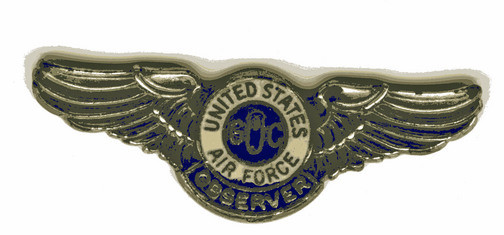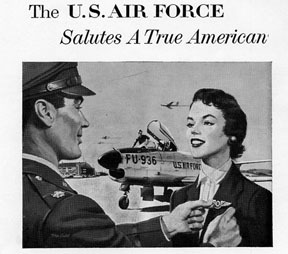Every now and then as I rummage through my things an artifact emerges to remind me that I am so close to angelhood that I already have a pair of wings.
These I wore proudly on the breast of my Boy Scout uniform over a half century ago, when the Cold War between America and the Soviet Union was at its coldest. Life back then was dangerous, so dangerous that I count myself lucky to have survived. For example, whenever the wind was blowing toward Utah, the Atomic Energy Commission would set off an atom bomb in Southern Nevada. Hours later, radioactive stems and pieces from the mushroom cloud would rain down upon my hometown. Were it not for the fact our house was completely covered in lead paint, I would have died for sure.
Meantime, off to the west, the U.S. Army was testing nerve gas at Dugway Proving Ground. Were the wind to shift in our direction, all we had by way of an early warning system was a band of foraging sheep—the so-called Ewe Line. Once those coal mine canaries of the prairies began to drop, a Civil Air Defense siren would sound, whereupon we were advised to duck and cover and hold our collective breaths until the danger passed.
Scariest of all was the threat of a sneak Russian air attack—possibly in the form of a ballistic missile but more likely in the form of long range bombers. After all, Price, Utah, was a mere 4,000 nautical miles from Murmansk via the North Pole. As Sarah Palin might say, I could practically see Russia from my porch!
Enter the Ground Observer Corps, a paramilitary arm of the U.S. Air Force whose job it was to maintain a constant lookout for Russian bombers. I was a proud member of the corps, and I’m pleased to report that no attack ever occurred during my watch. And even if it had, I’m pretty sure there’s nothing I could have done to prevent it. If I remember right, I was supposed to pick up the telephone and dial the Air Defense Filter Center in Salt Lake City. I would identify myself as “King, King Red”—or words to that effect. At the other end, a matronly volunteer known as a filterer would turn to another person known as a plotter and say, “King King Red Golf Mike Two One Black-South-Two-Flying West-One-Multi-Bomber-Height-at Two Two.”
I’m not kidding. That is just how close we came to global thermonuclear war in 1957!
Luckily, I never had to make that phone call. Air traffic over Price was light, consisting of an occasional Piper Cub, flying so low that I could make out its identification number: N88244. Hell, I knew that airplane. I even knew the pilot. It was Buck Davis, our local aviator and airport manager.
My observation post was a public telephone on Main Street in front of the Dinosaur Tire Service. There, Kenny Pitts and I would park our bicycles and spend an hour or so gazing upward. Inevitably, passersby would join in. “What are you looking at?” they would ask.
“We’re looking for Tupolev TU-95s. Myahsischev M-4/3ms.” we would answer. End of conversation.
To the north, the citizen volunteers of Myton had constructed an award-winning observation tower; to the south, a Blanding Boy Scout troop had constructed another from scrap lumber—based on the presumption that from a platform positioned eight feet above the ground, it’s possible to gain a clearer view of an aircraft cruising at 35,000 feet.
All who served were awarded silver wings. Observers who logged 200 hours or more were awarded medals at a ceremony hosted by the local American Legion Hall. In the GOC’s bi-monthly newsletter “Contrails” distinguished skywatchers, their necks crooked like hanged outlaws, were pictured collecting their medals. I’m sorry to say I never advanced in rank—but, then again, I did my small part to thwart the Red Menace.
Recently I recounted this story to Vera Andrianov, the woman who cuts my hair. Vera and her husband Yury are native born Russians who immigrated to America because they didn’t want their son Gregory to be drafted into the Red Army and sent off to fight and possibly die in a pointless military campaign in Afghanistan. Vera could hardly believe how crazy it all sounds.
I asked her what the Russians were thinking of America back in the days of the Cold War.
“We were scared to death of Americans,” she answered. And rightly so.


